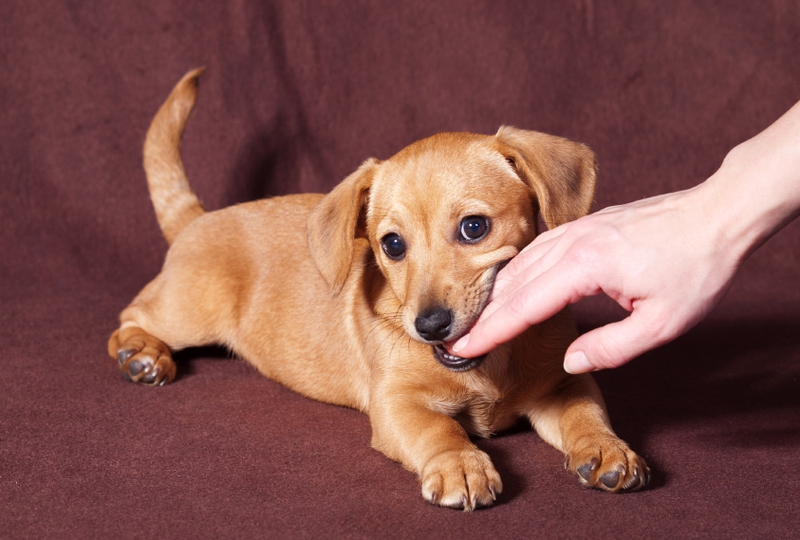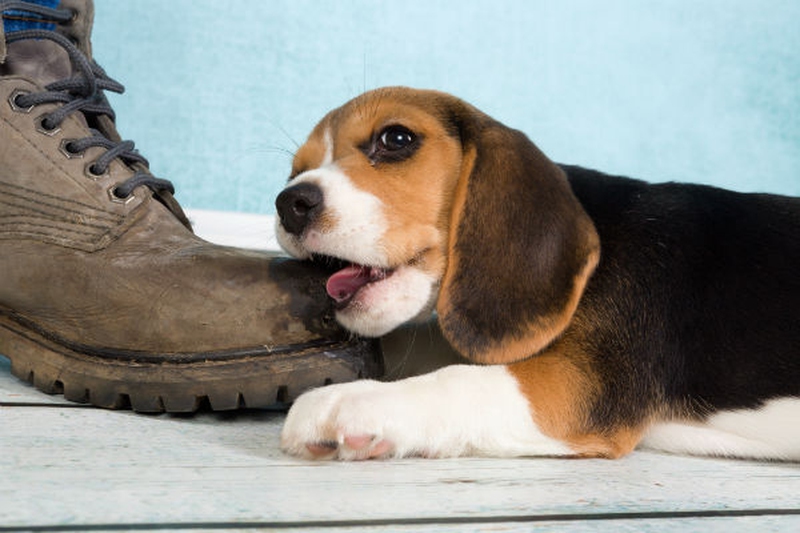Puppies are known to chew on just about everything including your fingers, shoes, and socks (often times while you are still wearing them). It is completely normal for puppies to want to investigate everything with their sharp puppy teeth. This isn't always something you want to encourage. While it can be adorable for them to nip or nibble on your hand when they are just a few weeks old, this isn't a behavior that is going to be as cute when they are a few months old and their teeth and grip can become more painfully. Then stopping them biting your hands and feet will be what you want to address and stop as early as possible.

How to Stop Puppy from Biting Hands and Feet
Rule out health issues
Most puppies chew as a way of being playful, but this can also be underlying health issues that you will want to rule out first. If your puppy has any pain in their mouth, this can cause them to have the need to chew more often to relieve the pain. Excessive chewing can also be a sign of aggression which can be harder to distinguish since playfulness and aggressive behavior in puppies can be fairly similar.
Give something else to chew
Providing your puppy with another item to chew on can be a way to distract them from your hands or feet. There are plenty of chew toys you can give to your puppy that will allow them to shift their focus. Toys attached to a pole or handle can be ideal since these will physically move them away from your hands. Other chew toys can be a great alternative - just be sure that you are not tempted to tug of war or wrestle the toy away from them which will put your hands near their mouth and result in biting. So try this next time if you wonder about how to stop puppy from biting hands and feet.
Don't give them attention
When your puppy is playing with you, like when they nip at your hands or feet, you should let them realize that this behavior is not acceptable. You want to refrain from giving your puppy any type of attention when they begin to nip at you and this includes yelling or screaming at them. Whenever your puppy begins to nip, simply walk away from them.
Don't encourage rough play
It is hard not to want to get down on all fours and wrestle around with your new puppy, but this only encourages the nipping behavior. While playing fetch or chasing after one another is acceptable play, you don't want to encourage any rough play which can lead to accidental biting or chewing.
Give rewards
You want to encourage your puppy to stop the nipping when it occurs. This can often be done by teaching them that it hurts by saying "oh" or giving out a whimper when they do it. You want to reward them with a treat each time they actually stop the nipping or biting when you give these verbal warnings.
Call a time out
How to stop puppy from biting hands and feet may require a time out. If your dog has a crate or gated off area in your home, then you want to put them there when they begin to nipping. This will teach them that that kind of play or behavior is not appropriate. It is often best to put your puppy in a time out when you notice that they are getting overly excited. This gives them a safe place where they can calm down.
Train them not to pounce
You can teach your puppy not to nip at your feet the same way you would teach them to walk calmly on a leash. This is done by holding a treat in your hand by your leg and not giving it to them until they are calm. This teaches your puppy to not only walk nicely alongside you but draws their attention away from your feet.
Anti-chew deterrent
There are sprays available that you can use on your hands, feet, socks or shoes that will discourage them from biting. These types of sprays are not harmful to your puppy and are safe to use on your skin and clothing without irritation or damage.
When and Where to Get Help
If your puppy seems to be nipping at you or others feet and hands more excessively, you want to consider speaking to a professional trainer. How to stop puppy from biting hands and feet may be a hard job for you. A professional dog trainer will be able to properly assess whether your puppy's chewing is normal play or the beginning of aggressive behavior. They will also be able to recommend the most effective treatment to correct the issues. When looking for a professional, be sure to find one that is qualified and certified.


View All Comments /Add Comment